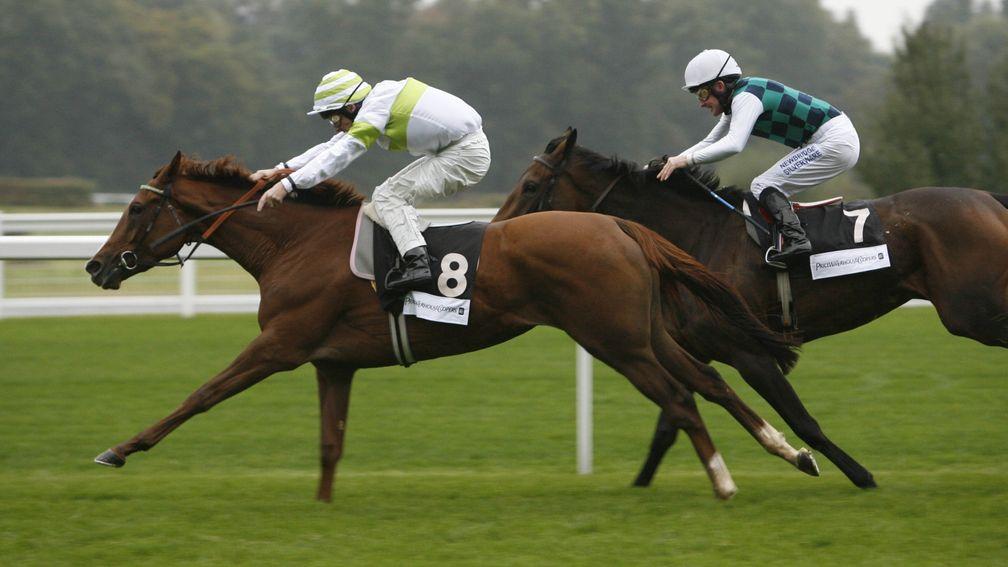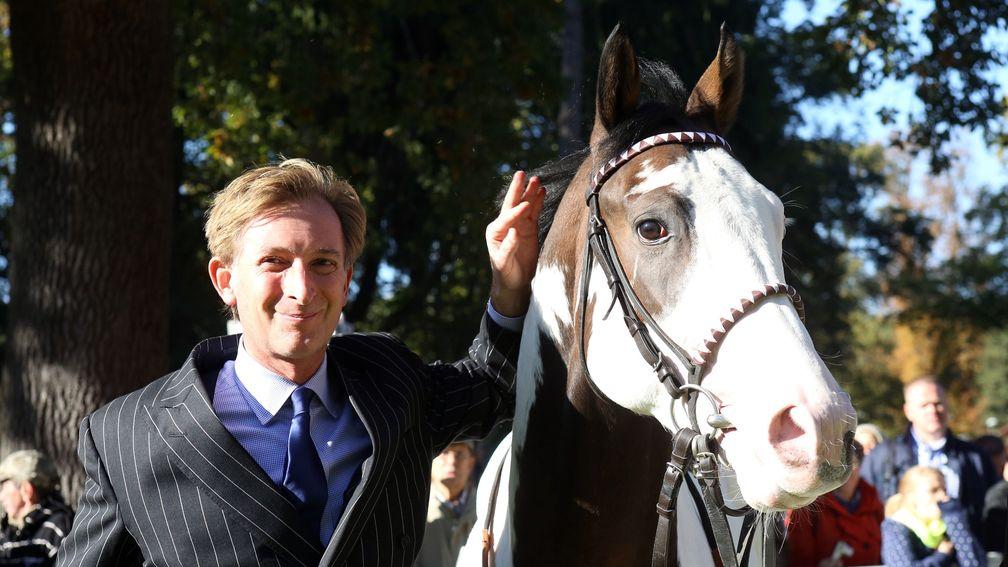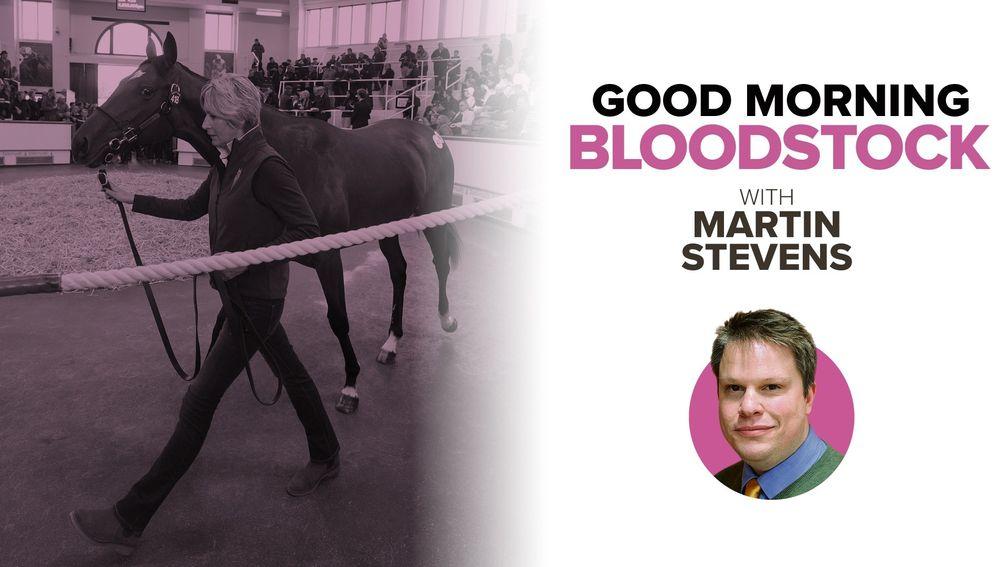Party host and winning breeder, it was a big weekend for Gerhard Schoeningh
Good Morning Bloodstock becomes Guten Morgen Bloodstock for at least a week!

Good Morning Bloodstockis Martin Stevens' daily morning email and presented online as a sample.
Well, we say Good Morning Bloodstock but for the time being he's gone east and so we'll be calling it Guten Morgen Bloodstock this week - subscribers can get more great insight from Martin every Monday to Friday.
All you need do is click on the link above, sign up and then read at your leisure each weekday morning from 7am.
Yes, you read the above correctly: Guten Morgen Bloodstock. All this week, and possibly a little further into next, I’ll be reporting from Germany as I travel around the studs that have produced celebrities such as Danedream, Lomitas, Manduro, Sea The Moon and Shirocco, as well as innumerable domestic Classic winners.
Before I embarked on my grand tour, I was kindly invited to a gala celebration for the 200th anniversary of German racing at the Hotel Adlon in Berlin – a venue chosen not just because it's one of the most glamorous addresses in town but also because it's situated next to the Brandenburg Gate, a moving symbol of German unity after the country’s troubled recent past.
During Friday's party we heard speeches from, among others, Dr Michael Vesper, one of the founding members of Germany’s powerful Green Party and the current president of Deutscher Galopp – just fancy that! – as well as Mr International Racing Winfried Engelbrecht-Bresges and Germany’s chief handicapper Harald Siemen.
It was also an eventful weekend for Gerhard Schoeningh. He was instrumental in organising and hosting the ceremony as a board member of Deutscher Galopp, and then over the weekend he welcomed thousands of people to his Hoppegarten racecourse in the leafy suburbs of Berlin for a two-day meeting celebrating the 200th anniversary.
Rather inconveniently, it was also on Friday evening, just as guests at the Hotel Adlon were tucking into their starters of a deliciously gooey burrata cheese, that Schoeningh’s sole broodmare Baisse, a daughter of High Chaparral boarded at the Cumanis’ Fittocks Stud in Newmarket, was represented by a rather exciting winner.
Her Dubawi two-year-old colt Lenormand, sold to Godolphin for 600,000gns at the Tattersalls December Foal Sale and now with Charlie Appleby, built on the promise of his debut sixth at Newbury to take a strong mile maiden at Newmarket by one and a quarter lengths, despite ducking right at the start.
No-one could accuse Schoeningh of putting self-interest above other people’s enjoyment, though; there was no surreptitious watching the race on a mobile phone held discreetly out of sight under the table.
“I was actually quite confused,” he told me at Hoppegarten the next day. “I received a text message from Crispin de Moubray, a friend of mine who helps me with a lot of matters, saying, ‘Appleby says the colt has progressed a lot, will not love ground but should win’ and I just assumed it was about Rebel’s Romance, who was running in the Grosser Preis von Berlin this weekend, so I just replied, ‘Okay thanks’. He must have thought I was being rude.
“I then started getting all these text messages from Fittocks Stud, congratulating me on the update for my mare, and it slowly began to dawn on me what had happened!”
Lenormand’s emergence as a promising two-year-old has come at just the right time, as his half-brother by Frankel is due to be offered by Fittocks Stud as Lot 361 in Book 1 of the Tattersalls October Yearling Sale.
The pair are also siblings to Australian Group 1 winner Best Of Days, and their dam – a half-sister to Dee Stakes and Sandown Classic Trial winner Azmeel bought as a yearling by De Moubray for 48,000gns – read the script by winning a Listed race at Hoppegarten for Schoeningh.
Schoeningh’s white silks with a pale green stripe, shared with the Ennismore Racing syndicate he sometimes raced under, were once a fairly common sight on British racecourses. They were carried by the likes of Harvest Stakes winner and Park Hill Stakes third Brisk Breeze and classy middle-distance performer Tempelstern, both of whom were trained by Sir Henry Cecil.

“Henry was my first trainer and at my peak I had five or six horses with him,” says Schoeningh. “I must say, after he died I found it hard to find another trainer. He was just such a unique guy and a good friend.
“I’ve experimented a little bit and had horses with all the pretty obvious alternatives, but I don’t have many in training now. I think you really need four to give you a chance, working on the basis that three will flop and one might give you a certain amount of pleasure.
“I had three fillies with Ralph Beckett at one point and one died, one injured herself and one was useless – just bad luck, but it puts you in an awkward situation where the trainer only ever has bad news for you and you never get to experience an environment where everyone is enthusiastic, so it all just fizzles out.”
There is another good reason for Schoeningh cutting back on the number of horses he owns, and that is simply that he has his hands full with owning and running a racecourse – and in the process of doing so, regularly coming up against the one thing that Germany does better than breeding stayers: bureaucracy.
“The big angle at Hoppegarten is developing the non-racing side and it’s a tough political task,” he says. “We want to get a major events licence, and while the county council is very pro the idea, and accepts that in order for me to invest in the place and make it financially viable I’ll need to utilise its assets for other things, the local council has some people who are strongly opposed.
“We want to be able to hold open-air music festivals like British Summer Time in Hyde Park in London, where we can erect a temporary stage, install other necessary facilities, book some big acts and then de-rig it all after a weekend.”
Schoeningh is also hoping to develop a small, dormant area of the racecourse estate into housing.
“Over there, for instance, there is a ten-hectare site that isn’t used,” he says, gesturing to the left of the track as you look at it from the stands. “It would be one of the best addresses in the area, with an uninterrupted south-westerly view of the track and only a five-minute walk to the train station, but some people don’t want it and my time is taken up with constantly fighting those battles.
“A lot of tracks are in the same situation. They have a lot of land and need to utilise it. And, by the way, what we’re planning here is probably less than 20 per cent of what has happened at Newbury.”
In previous interviews in the German media, Schoeningh has made no secret of the stakes involved in the future of Hoppegarten – considered to be German racing’s HQ in its former heyday as a training centre, and a fair, free-draining track that features the country’s only seven-furlong straight – and he repeats them here.
“The bottom line is, I’m unwilling to pour endless amounts of money into a project that can’t be profitable because we’re not allowed to use the potential of the site,” he says bluntly.
I wouldn’t want the first edition of Guten Morgen Bloodstock to end on a sour note, though, so I’ll sign off with my impressions of a first visit to Hoppegarten.
The racing was competitive – certainly more than the fare being served up at home on a daily basis at the moment – and featured competitors from a range of countries, especially the emerging racing nations of eastern Europe.

There were several classy winners on Saturday, when I’m writing this email, and I would be surprised if we don’t hear more from Granada, Gestüt Fährhof’s Areion filly who was a smooth winner of the two-year-old race on the card, or Aemilianus, a three-year-old Holy Roman Emperor half-brother to high-class pair Alson and Ancient Spirit who remained unbeaten for Gestüt Schlenderhan in the mile conditions stakes.
There’s also plenty to see and do away from the racing at the track, which doesn’t suffer from the British disease of depriving people who can’t afford higher admission fees the chance to see horses in the parade ring and winner’s enclosure: for example, pony rides, a funfair, shopping outlets and, ja natürlich, an oompah band and beer garden.
Crowds looked solid if unspectacular, but then the unbearable temperatures in Europe at the moment will have put off many locals. I was a little sad not to hear more British or Irish accents among the racegoers though, as a short city break with a trip to Hoppegarten is so easy and comes highly recommended.
Flights to Berlin, with its incredible history, sights and buzzing cultural scene, are cheap enough if you book early, as is accommodation; and the racecourse is only a short, direct journey from the city centre on the local overground train.
Gerhard Schoeningh deserves the support for all that he is investing into this historic track, both in terms of effort and financial expenditure, and who knows what superstars of German racing you might see in the sport’s 201st or 202nd year?
What do you think?
Share your thoughts with other Good Morning Bloodstock readers by emailing gmb@racingpost.com
Must-read story
"I’ll also be offering incentives to breeders who produce his best Flat progeny, and while I can't stand him for free, I want him to get as many mares as he can to give him a chance to prove himself,” says Bjorn Nielsen as he opens up about all things Stradivarius related in an interview with Julian Muscat (£).
Pedigree pick
Gimmie Shelter, the Kitten’s Joy brother to owner-breeder Scott Heider and trainer Joseph O’Brien’s former Group 3 winner Crossfirehurricane, could give connections satisfaction in the mile maiden at Dundalk (2.10) on Monday after finishing a promising third on debut at Killarney last month, but it could be all over now for him if Ballydoyle newcomer Adelaide River lives up to his pedigree.
Aidan O’Brien’s charge is by Australia and if the first produce of Could It Be Love, a War Front half-sister to US champion two-year-old and leading sire Uncle Mo. The dam herself broke her maiden at Dundalk (albeit at three) and went on to finish second to Alpha Centauri in the Irish 1,000 Guineas and third to Expert Eye in the Jersey Stakes.
Don’t miss ANZ Bloodstock News
Sign up for free to our weekly Asia Bloodstock News publication to receive news and features from all things racing and bloodstock across Mainland China, Japan, Hong Kong, Singapore and beyond.
Make sure to read this week's Asia Bloodstock News
Subscribe for free for the latest bloodstock news from Australia, New Zealand and beyond.

Good Morning Bloodstock is our latest email newsletter. Martin Stevens, a doyen among bloodstock journalists, provides his take and insight on the biggest stories every morning from Monday to Friday
Published on 15 August 2022inNews
Last updated 09:23, 15 August 2022
- ‘It’s been constant pressure for the last six months’ - up-and-coming consignors out to make dreams come true at the Doncaster Breeze-Up Sale
- Three new board members for the National Stud
- Hide The Evidence a first winner for Sands Of Mali with victory at Bordeaux Le Bouscat
- Showcasing filly from a deep Moyglare family set for Gowran Park debut on Tuesday
- Little Big Bear's brother and close relation to Unquestionable face off in Curragh maiden on Sunday
- ‘It’s been constant pressure for the last six months’ - up-and-coming consignors out to make dreams come true at the Doncaster Breeze-Up Sale
- Three new board members for the National Stud
- Hide The Evidence a first winner for Sands Of Mali with victory at Bordeaux Le Bouscat
- Showcasing filly from a deep Moyglare family set for Gowran Park debut on Tuesday
- Little Big Bear's brother and close relation to Unquestionable face off in Curragh maiden on Sunday